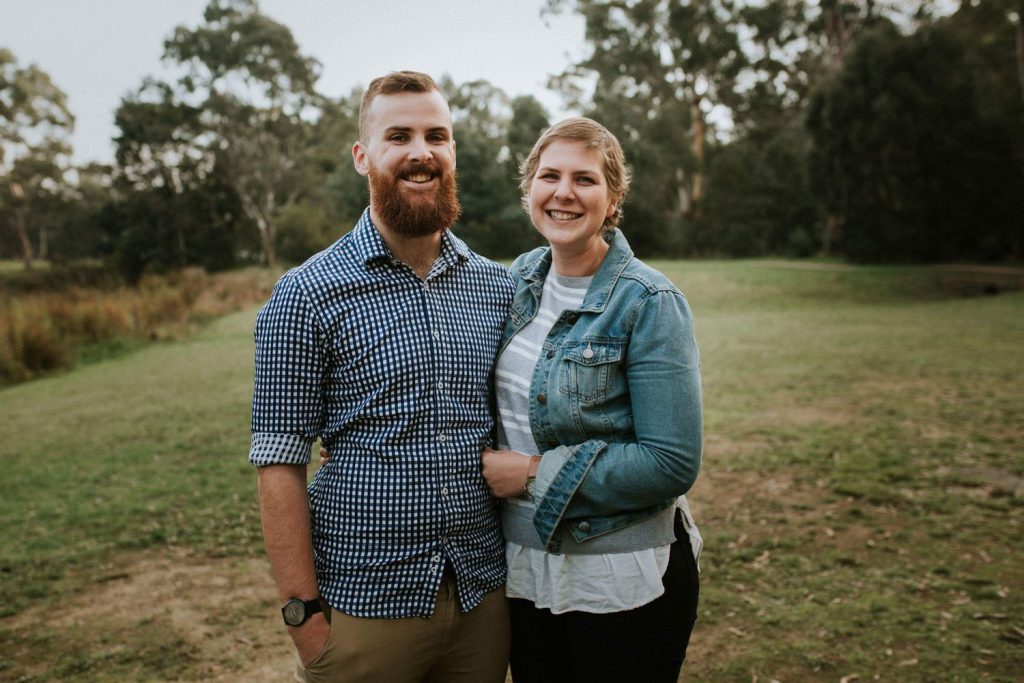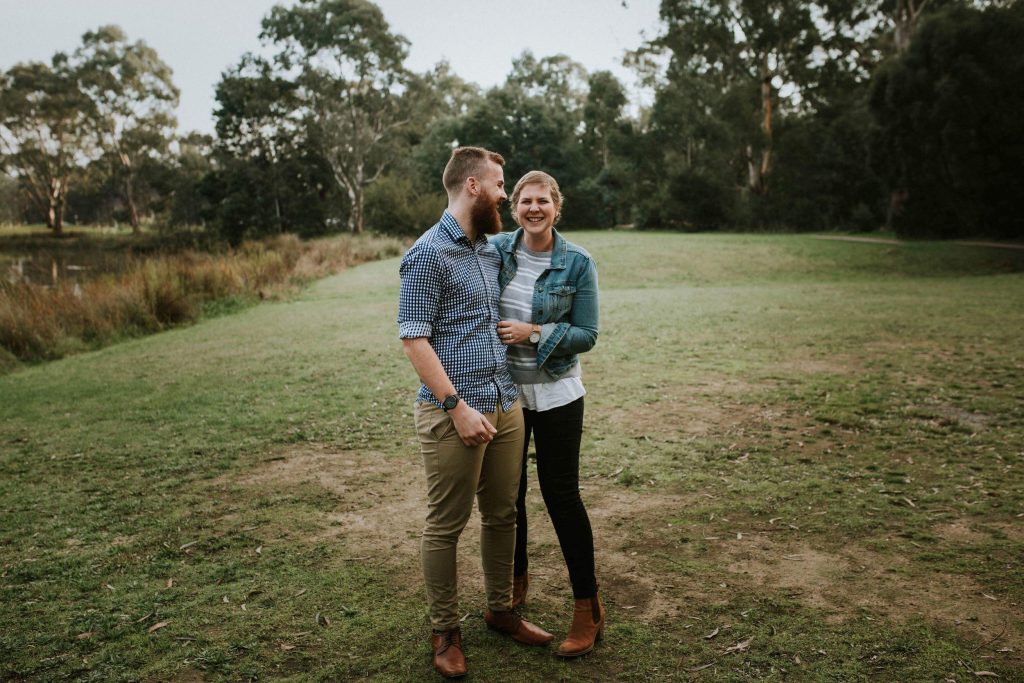June 28, 2018
Lifelong Promises, Lofty Goals

Jimmy and Sarah Young have been married for over 4 years and live in Caroline Springs, Victoria. Jimmy is a Pastor at Red Door Church and Sarah works as a Psychologist. In their spare time, Jimmy does all the cycling while Sarah drinks all the good coffee.
For better, for worse
For richer, for poorer
In sickness and in health
To love and to cherish
Til death do us part
My husband and I said these vows over four years ago now. What a beautiful day it was! What exhilaration and bliss we felt! Reflecting on these hefty statements now, I can see how each of these promises has been tested over the course of those short few years.
We live in a world that exhibits little honour for promises and covenants. You can break your way out of a phone contract or a gym membership. You can turn your back on friends whom you swore you’d always be there for. And let’s face it, you can even divorce yourself from the spouse whom you vowed to commit to ‘til death do you part.’
Today, the average length of a marriage in Australia is 12 years. Just 12 years?! We make such hefty promises and yet we have the option in Australia today to opt out when we’ve had enough. These promises we make are a beautiful idea, but tough to keep when the rubber hits the road. Where are we going wrong? What do these promises even mean?
“For better, for worse”
It’s no surprise that life comes with its challenges. And even in the peaks of young love, it doesn’t take long for your once dreamy “can-do-no-wrong” partner to let you down in some way. No human being is perfect, so in marriage we can (and should) expect conflict. Like, real conflict. Like, “Can we survive this?” conflict.
I don’t think I fully understood what these words meant when I promised them to my husband, James. I made the statement, “I take you to be my husband, for better, for worse..” This means what it says! I take you to be my husband if things get better and when things get worse.
When our circumstances suck, I’ll be here.
When we’re successful and things are smooth sailing, I’ll be here.
When the ground beneath us falls, I’ll be here.
When life is everything you want it to be, I’ll be here.
These promises recognise that we can’t always live in the bliss of our wedding day. Life rolls on and sometimes things are awesome, but sometimes they suck hardcore. These vows prepare us to recognise that marriage is made to last for every season.
Whilst the circumstances of our lives eb and flow, we make a commitment to our spouse that we will love them regardless. Whilst there is a temptation to only love them in seasons where it’s easy, this promise prepares us to commit to our spouse in every season of life, which includes every circumstance and personal struggle.
Marriage is the crucible that refines us. We believe it is one of God’s designs to make us more like his son, Jesus, and bring about fruits in us that glorify him. It is possible for two flawed people to keep these promises because God gives us grace to change and love one another.
Marriage is a mirror that reflects all of our insecurities, flaws and failure.
“For richer, for poorer”
I’m married to a pastor. Safe to say I didn’t enter this marriage for the money! On the flip side, I work as a psychologist, so together we always felt that we could make things work financially.
Seasons change, as we expect them to, and sometimes the stability of a solid income just isn’t there. Perhaps, like it did for us, sickness hits out of nowhere which means you’re relying on one income. Or maybe one of you loses their job or becomes redundant. How does love work in seasons like this?
Sub-consciously some of us vow that we will love and cherish the other so long as they can provide stability, a life of comfort, and heck, even luxury. Or maybe toning it back a bit we just want to feel like our spouse is capable and reliable, and when work and money isn’t coming in we start to question this.
Vowing to love “for richer, for poorer” challenges us to see love as something that supersedes temporary material things. It also challenges us to see and love our spouse not just for what they do for us and provide for us, but for who they are underneath. Character is always more important than competency, and seasons like this will reveal what we really value: monetary stability, or relational stability.
“In sickness and in health”
Oh boy, this has been the tough one for us. Sometimes knowingly, and other times by surprise. My husband, James, was diagnosed with Chronic Fatigue Syndrome at the age of 14. This illness robbed him of the majority of his teenage years, and shaped his character way before I met him at age 20. When we were dating, I was aware of James’ illness but never got to see all that it meant for him until were married and living together.
It’s been said that people with Chronic Fatigue Syndrome get about 20-30% of the restful, restorative sleep that those in the general population do. I knew this, but didn’t see it in it’s fullest effect in James until we married. This meant that during the early stages of our marriage I was still learning so much about James, and consequentially, his needs.
Couple this with chronic gut problems, and marriage suddenly looks more like tucking James into bed and cleaning up vomit in the shower than going out on romantic dates. It looks more like staying home and not going to friend’s parties or weddings because that’s what love does.
In our fourth year of marriage, love looked like James standing alongside me as I went through six months of moderate chemotherapy for Lymphoma. For the first three years of our marriage, James was always the sick one in our household. I had become used to being his carer, and so discovering that I had an aggressive, cancerous tumour flipped this pattern on its head.
Thankfully, he was in a healthy place during this season, and he showed me what sacrificial love looked like. On reflection, I had to learn to receive without being able to give anything back. This was a different, but significant season for our marriage.
This season has shaped us, grown us and provided us with a clear opportunity to live out these vows. This is what marriage means. Staying when it’s easier to leave. Enduring when it’s easier to give up. Forgiving when it’s easier to hold grudges. Sacrificing when it’s easier to serve oneself.
We have a God who shows us what covenant looks like. Despite our rebellion, sinfulness and destructive habits, God shows us his covenantal promises in his son, Jesus Christ. He loved us when we were far from him, hating him. He laid down his life for us whilst we had nothing to clean ourselves up with. He shows us what unconditional love looks like, loving without conditions. He shows us how to love sacrificially when our spouse is “covered in vomit”, covered in anger or covered in selfishness, in all seasons.
“Til death do us part”
I’ve been to a few weddings lately whereby the celebrant has allowed the couple to write their own vows. Instead of vowing to love “til death do us part”, this vow has been subtly reconfigured to suit our selfish needs. Today, the time frame we put on these promises to love is commonly stated, “as long as love endures.”
This doesn’t surprise me, but reflects how we often approach marriage and relationships. The world says, “Don’t be with anyone that makes you unhappy.” If that were the case, James and I would’ve been out after the first day! In vowing to love “til death do us part”, we are promising to live in covenant for life, not for a season, not for the first 12 years, but until we are separated by death itself.
This doesn’t mean that there aren’t seasons whereby things are extremely difficult, of course there are. However, that’s what the other vows are there for! There are no outs. Divorce isn’t an option, or a plan B. We are committed to this relationship and we will stick it out til the end. If I vowed to commit to James “as long as love endures”, what does that even mean? How do we know when love is over? Our feelings? The season we’re in? The consequences of this are huge.
Dietrich Bonhoeffer summarised it like this, “It is not your love that sustains the marriage, but from now on, the marriage that sustains your love.” Having a firm foundation of covenantal promises with no plan B, means that in seasons of great joy and great sorrow, in plenty and in want, in sickness and in health, we’re not going anywhere. Our commitment sustains our love, not the other way around.
Written by Sarah Young
If you’d like to read more of Sarah and Jimmy’s journey – check out their blog Stirring Our Affections and article
http://stirringouraffections.com/there-is-no-greater-aim/

